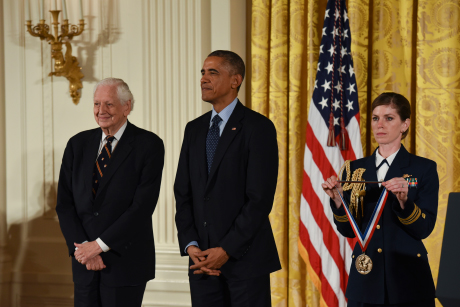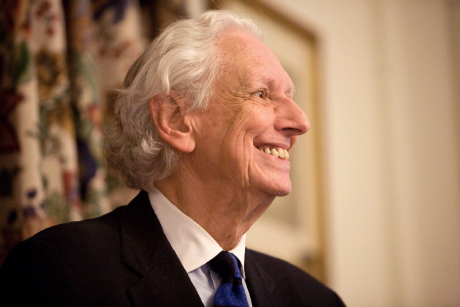Jerrold Meinwald wins National Medal of Science
By Anne Ju

Jerrold Meinwald, the Goldwin Smith Professor of Chemistry Emeritus, has received the National Medal of Science, the nation’s highest honor for achievement in science and engineering. Meinwald received the medal in chemistry; other awards were bestowed in behavioral and social sciences, biology, engineering, mathematics and physical sciences, the White House announced Oct. 3.
Over his long career, Meinwald, who joined Cornell’s faculty in 1952 as an instructor in chemistry, has made fundamental discoveries of how chemicals act as repellants and attractants between organisms. He and the late Thomas Eisner, a longtime friend and colleague who won the National Medal of Science in 1994, are credited with establishing the field of “chemical ecology” – the science that deals with the many ways animals, plants and microorganisms chemically interact.
“It’s a very nice thing,” Meinwald said of the award. “It’s maybe a representation of a growing interest in the field of chemical ecology.”

Meinwald’s research has involved the isolation and identification of biologically active compounds from insect and other arthropod sources; pheromone systems of some amphibian and mammal species; and identification of messenger molecules involved in such systems and the understanding of underlying signal transduction pathways.
Meinwald has helped decipher the intricate chemical strategies that insects use for a variety of activities: mating, location of food, protection of offspring and defense against attackers. Throughout his decades-long scientific partnership with Eisner, Eisner, a biologist, conducted most of the biological experiments, while Meinwald and his research group of undergraduates, graduate students and postdocs provided the essential chemical expertise.
Chemicals of unforeseen potential have been among Meinwald’s findings over the years. He helped discover that birds and spiders reject fireflies because of lucibufagins, a family of steroids, which Meinwald isolated for the first time. These compounds have proved to have cardiotonic and antiviral effects, with potential therapeutic value for humans.
Meinwald began his career as a “conventional organic chemist,” he said, but moved on to do “collaborative chemistry” with Eisner. Meinwald is an active advocate for chemists who seek scientific partnerships outside of chemistry, whether in biology, physics or other fields.
“My own award represents a career built in large part on collaboration,” he said.
Dave Collum, chair of Cornell’s Department of Chemistry and Chemical Biology and the Betty R. Miller Professor of Chemistry, called Meinwald a “remarkable human being with a soft-spoken, easy-going style that stands out among the scientific elite.”
“He is a stupendous colleague – a gentleman and a scholar. We at Cornell are very proud of Jerry in so many ways,” Collum said.
A member of the National Academy of Sciences since 1969, Meinwald’s awards include the 2014 Nakanishi Prize of the Chemical Society of Japan – named for Koji Nakanishi, Meinwald’s colleague during graduate school; the 2013 Benjamin Franklin Medal in Chemistry; the 2008 Grand Prix of la Maison de la Chimie; the 2005 American Chemical Society Roger Adams Award in Organic Chemistry; the Czech Academy of Sciences Heyrovsky Medal; the Gustavus John Esselsen Award for Chemistry in the Public Interest; the International Society of Chemical Ecology Silver Medal; the Tyler Prize for Environmental Achievement; the Arthur C. Cope Scholar Award; and the American Chemical Society Ernest Guenther Award.
Meinwald received his Ph.D. (1952) and M.A. (1950) from Harvard University and his B.S. (1948) and Ph.B. (1947) from the University of Chicago.
A musician as well as a scientist, Meinwald plays the flute and the recorder. In 1989, he, Eisner (who played piano and harpsichord) and Swedish colleagues performed a concert of 18th-century chamber music at the annual meeting of the International Society of Chemical Ecology in Sweden. At the Nakanishi awards ceremony in Nagoya, Meinwald performed Mozart flute duets with Japanese chemist Eiichi Nakamura.
May Berenbaum, Ph.D. ’80, a professor of entomology at the University of Illinois at Urbana-Champaign, also received the National Medal of Science. She studies the chemical mechanisms underlying interactions between insects and their host plants, including the detoxification of natural and synthetic chemicals. An academic who is equally devoted to teaching and fostering scientific literacy, Berenbaum has authored many articles and books about insects for the general public. Eisner served on Berenbaum's thesis committee during her graduate studies at Cornell.
Other notable Cornell faculty winners of the National Medal of Science: Eleanor Gibson in 1992, Roald Hoffmann in 1983, Wendell Roelofs in 1983, Efraim Racker in 1976, Hans Bethe in 1975 and Peter Debye in 1965.
Get Cornell news delivered right to your inbox.
Subscribe